A. A. Paryski: Ameryka-Echo
The Ameryka Echo had an interesting history and it had an interesting leader. Started in Toledo by A. A. Paryski in 1889, it was a cultural newspaper that was often pro-labor. Paryski had used his publishing corporation to also publish books and other materials on a wide range of subjects from religion and anti-Catholicism to home economics to pulp fiction. He had his admirers and detractors, detractors who believed he was making profit off of illiterate or uneducated immigrants. But his diversified subject matter and the low cost of these publications is precisely what drew his audiences. For a small sum and with language and matter geared toward the Polish immigrant, he was able to sell what he believed was valuable editorial and educational information.
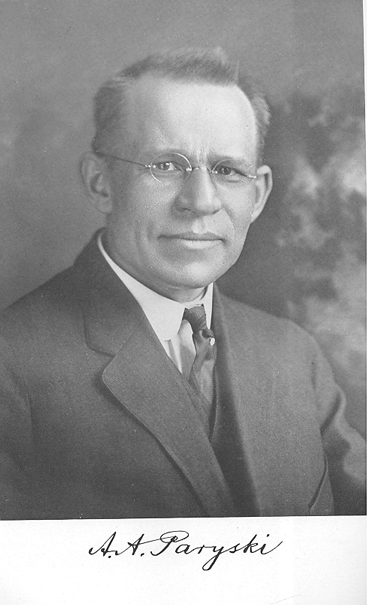
Before starting his publishing company, Paryski was a reporter for several newspapers: the Detroit Free Press, Chicago Daily News, Detroit News, and the Philadelphia Record. Born near Łowicz (Warsaw region) on 11 July 1865, his parents later moved to a small village, Urzecze, and bought a farm. As a young man, he took an exam to be a postal clerk in order to support himself. He was soon promoted to a post office in Warsaw but did not serve there long as he was to enter military service. Instead of going into the Army, Paryski left for America in 1883. He was only 18 years old at the time. Paryski intended to head to Chicago, but his money took him only as far as Wayne, Michigan. Here he got a job as a farmer with whom he worked for about a year and a half. During this time, he managed saved over $100. While working, he attended school to learn English, and later obtained a job at a printing house and studied while working at the printing house. He also worked several months at a newspaper named “Gazeta Narodowa” as an editor. The newspaper went bankrupt shortly after and Paryski was able to move on to Chicago where he worked for two publications, as a typesetter at Gazeta Katolicka and then at Gazeta Polska. In Chicago, he also continued his education and took active part in workers’ movements, frequently writing article and helping to organize through Polish groups as “Knights of Labor.”
He moved on to Winona, Minnesota where he ran the editorial office of the “Wiarusa,” only to find the paper went out of business within a short time. He then was in Chicago again, and in Milwaukee for short periods of times both writing or editing columns for and about workers.
Paryski then traveled around the United States as a labor organizer for the “Knights of Labor,” visiting many major US cities, landing in Philadelphia heading the department of workers’ affairs in the national newspaper, “Record.” During this time, he had some saved money and wanted to study medicine. He traveled to Cleveland and studied medicine at the Western Reserve Medical College for a time, but ran out of funds. So, he took a position as editor at the “Głos Wolny” in Buffalo.
In 1888, Paryski was only 23 years and and managed to obtain a wealth of experiences in five short years. That year, a group of Poles in Toledo intended to establish a company to publish newspapers and invited Paryski to join as an editor of a publication named “Gwiazda.” Although it had support and it seems some financial backing from a Karol Czarnecki, and had about 5,000 subscribers, it did not generate an income and collapsed. Paryski then went to Detroit to help start another similar newspaper, also named “Gwiazda.” The intent was to circulate the publication in Toledo as well as Detroit, but Toledo Poles wanted their own paper and came back to Paryski asking him to help them establish their own paper. On 21 September, 1889, the “Ameryka” was first published.
Ohio History Central states that Parynski was a proponent of “Polish Positivism.” This was an intellectual movement from Europe that started in the end of the 1800s. It embraced the philosophy that all parts of society work towards one goal, toward a positive goal. It seems that the 1863 Polish Uprising had an influence on this positivism and it also drew from the works of August Comte to advocate reason before emotion. This movement began in Poland while Poland itself was no longer on the map due to its partitioning between Germany, Austria, and Russia. Positivism was seen as a force to “build from the the foundations”–create a strong infrastructure and educate the public in order to build a re-unified Poland. This philosophy later spread to Poles who immigrated to the US–they believed in creating a strong foundation–strong families, good work ethics, educate their children, build churches and schools. Paryski seemed to want to inform and educate Polish immigrants as well as provide them a vehicle for communicating news between their communities.
While the Ameryka had several name changes during its early existence, its merger in 1902 with a Polish newspaper in Buffalo, the “Echo” the publication obtained its final and lasting name, Ameryka Echo. The newspaper was distributed well beyond Toledo, as far as Chicago, into rural areas, and other areas where there was a large Polish population. Ohio History Central even states there were readers of the newspaper in Poland. By World War I, circulation was around 50,000 and increased to about 120,000 in the 1920.
Paryski was unafraid of politics within the Polish American community of Toledo and he often unabashedly, very openly, confronted those from his own community that he believed to be in the wrong. One of these persons that were openly bashed was a Boleslaus Dalkowski, a Toledo businessman. Dalkowski worked for the Echo for a short time and there seems to have been some bad blood between Dalkowski and the Ameryka Echo.
Paryski became known as the “Polish Hearst,” he was compared to William Randolph Hearst. The Ameryka Echo was eventually published in both Toledo and Chicago, reaching a large Polish audience. With this audience, letters to the editor were written to Paryski (often in Polish) and published. The paper itself was primarily written in Polish and spread news of Poles in Buffalo, Pittsburgh, Cleveland, Detroit, Toledo, and Chicago. Announcements of events, advertisements of Polish businesses, and discussions of national and world events were published.
The Ameryka Echo remained in print until about 1972. The printing plant was located at 1154 Nebraska Ave. A city block card from the Lucas County Auditor’s office from about 1937 shows an image of the plant.
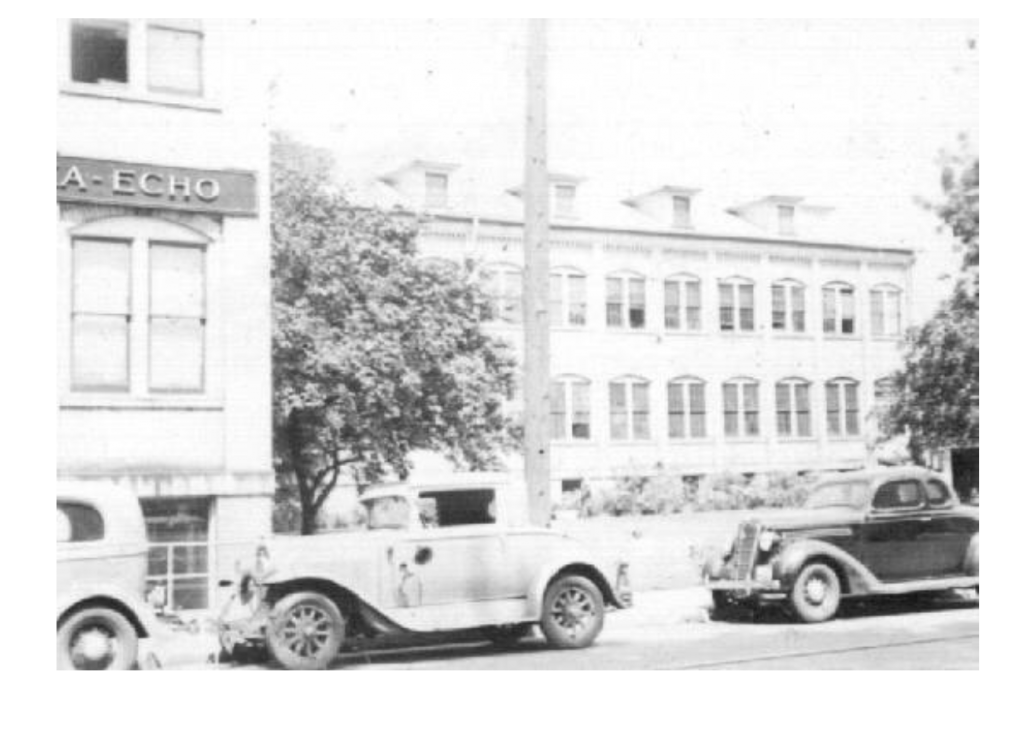
The plant burned down in 1974.
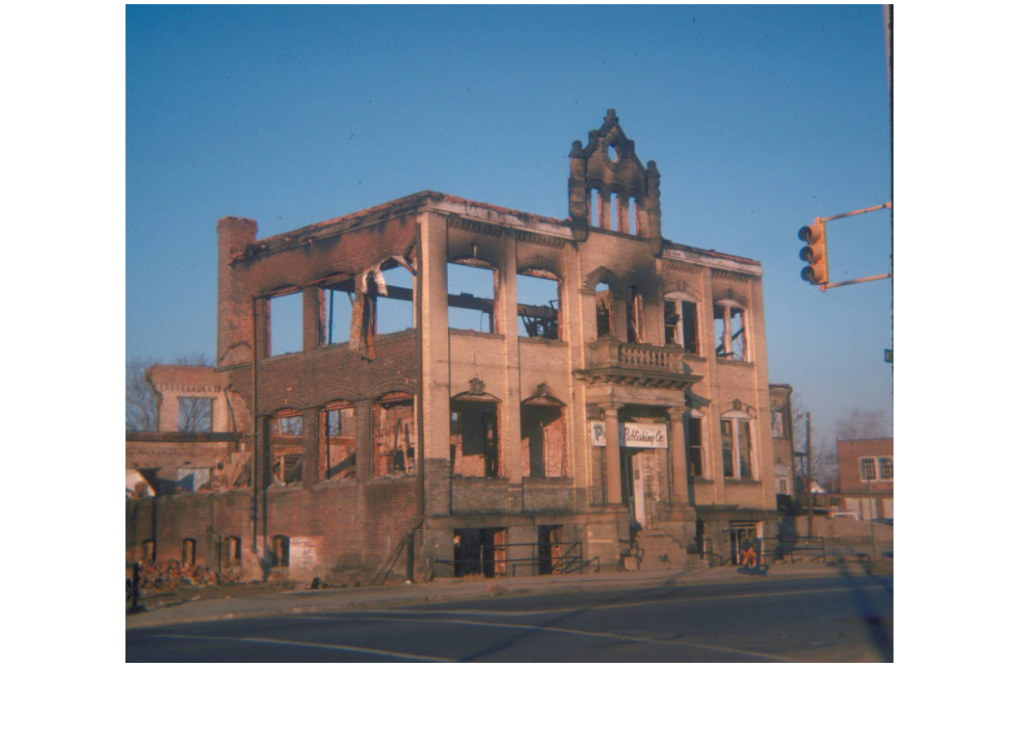
The Library of Congress has a wonderful collection of American published newspapers online called “Chronicling America: Historic American Newspapers.” You can search copies of Ameryka Echo using this link.
Paryski died on 23 April 1935. Grove Patterson, the editor of The Toledo Blade gave a eulogy at his services. The Toledo Blade, Toledo News-Bee, and the Chicago Tribune all carried his obituary. The News-Bee obituary date 24 April reads:
A. A. Paryski, Publisher, Dies
Famed Editor of Ameryka Echo Sent his Books Throughout the World.
Picture on Page 2.
Anthony A. Paryski, publisher of the Ameryka Echo, Polish language weekly for nearly 50 years, died Tuesday afternoon in his home, 1063 W. Woodruff Ave. He was 70.
Mr. Paryski, one of the world’s outstanding publishers of Polish books and periodicals, printed the first edition of the Ameryka Echo here in 1886, five years after he came to this country from Lowicz, Poland, his birth place.
Since 1910, his publishing house has been at 1140-54 Nebraska Avenue. It is estimated that he has published more than seven million books in the Polish language. Before coming to Toledo in 1881, Mr. Paryski had published Polish language periodicals in New York and in Buffalo. His publications were read throughout the world.
During his early years in America, he was active in the labor movement and was one of the organizers of the Knights of Labor, forerunner of the American Federation of Labor.
The distinguished publisher was recognized here and in Poland as an untiring working for his countrymen. Before entering the publishing field, Mr. Paryski was a reporter for the Detroit Free Press, Chicago Daily News, Detroit News, and Philadelphia Record.
Mr. Paryski leaves his wife, Mrs. Irene Paryski; two daughters, Mrs. Helen Plutynska and Miss Marie Paryski and son, Thadeus; a brother, Michael, and a sister Lucy, both of Poland. The body is in the Gasiorowski Mortuary.
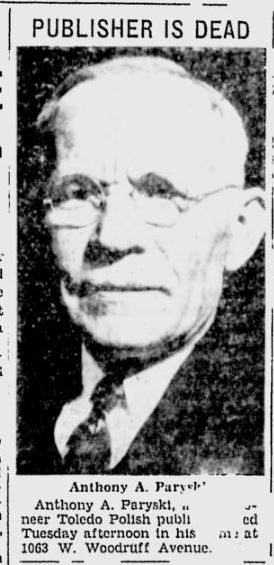
###
For a small taste of what the Ameryka Echo contained in its newspapers, here are a few tidbits from January 28, 1893:
Pierwszy Wielki Bal (The First Great Ball)
An announcement of a social event at the Kusza Hall. Translation follows.
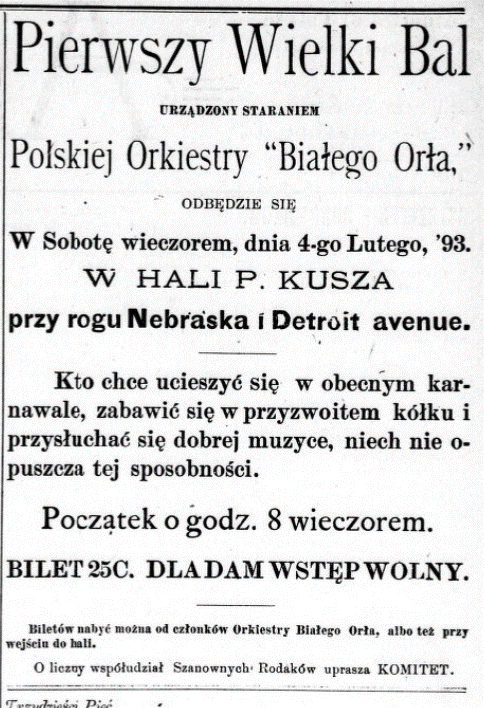
The first great ball of the Polish White Eagle.
Saturday evening, February 4, 1893
Will be held in the Kusza Hall on the corner of Nebraska and Detroit Avenues.
Whoever wants to enjoy and listen to good music does not want to miss this opportunity.
Beginning at 8 p.m.
Tickets can be purchased from the members of the White Eagle Orchestra or at the entrance to the hall. 25 cents for tickets.
The committee is asking for contributions by honorable countrymen.
Zapowiedz Slubu (Marriage announcement)
Not all of our ancestors stayed in the US after coming. Some returned home. It appears a Mr. Josef Nowak lived temporarily in Toledo, belonging to St. Anthony’s parish and he returned home to marry. This is an announcement asking for obstacles against the marriage. Translation below.
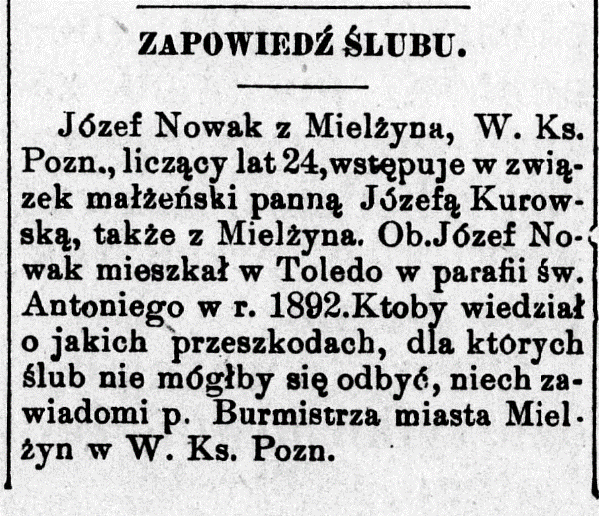
Jozef Nowak, from Mielzyn, Poznan, 24 years old, will marry Miss Jozefa Kurowska, also, from Mielzyn. Jozef stayed in Toledo in the parish of St. Anthony in 1892. If anyone would know about obstacles against the wedding which could be overcome, please inform the Mayor of Mielzyn.
The Echo did not mince word when it came to politics. It was a publication that was in support of labor and did not hesitate to speak plainly on political candidates or issues. A story that clearly struck out to me was an article that opposed Mr. Michael Brzecka, also known as Majek Zabijak, who was running to be an elected assessor for Toledo’s 2nd ward. An illustration was published of Zabijak as a pig on 28 October 1899. Michael Brzecka was the step-father of Boleslaus Dalkowski.
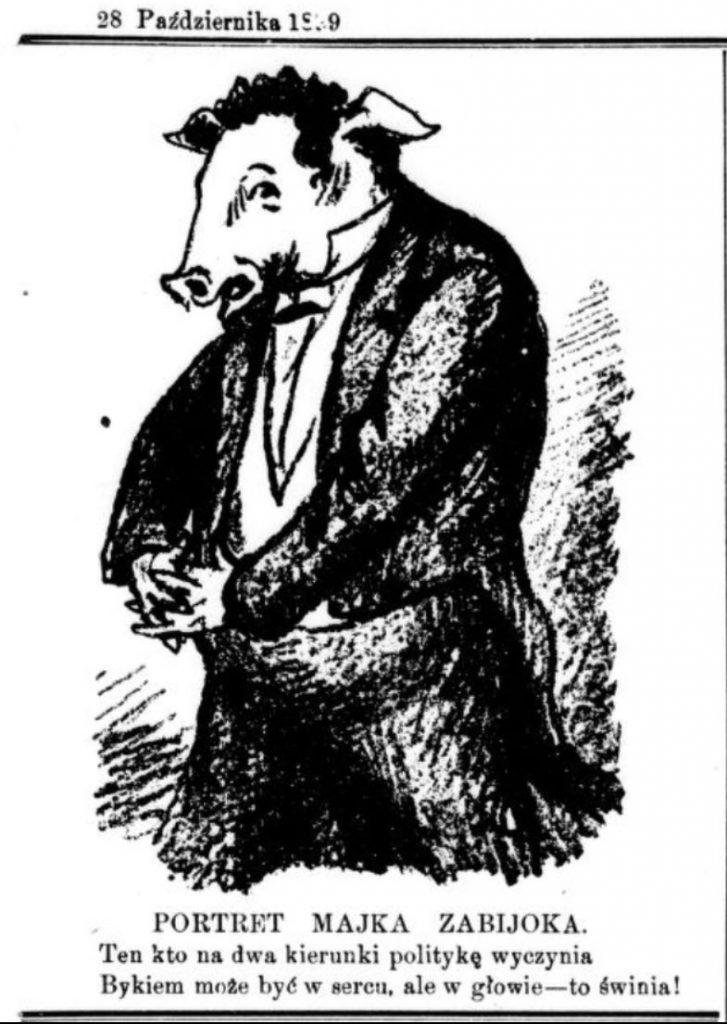
The caption beneath this illustration, translated, reads: “Portrait of Majek Zabijak The one who plays politics in two directions. It may be a bull in the heart, but it is a pig in the head.”
I will guess that rough political talk did not begin in 2016.